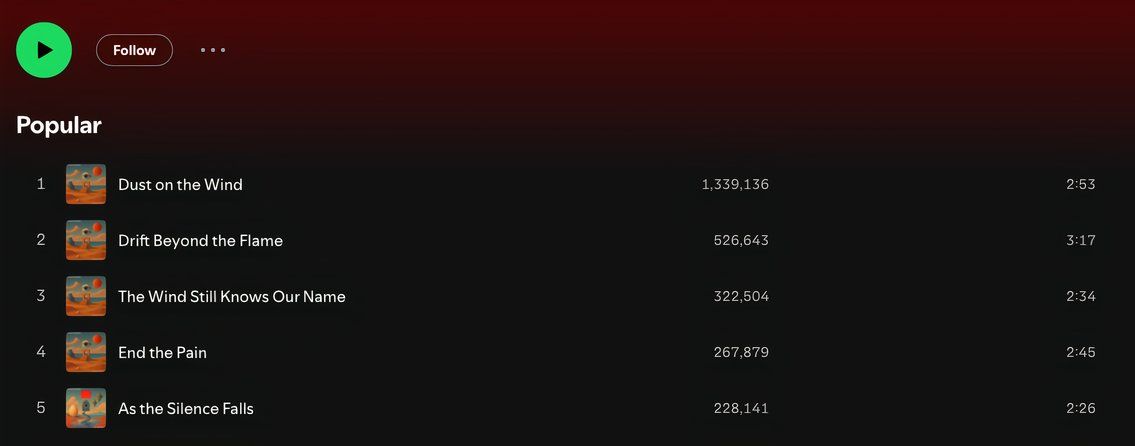Select Language:
Artificial intelligence is permeating various areas of our daily lives, including music! If you prefer not to listen to AI-generated tunes on your music streaming service, these tips can help you recognize and avoid them.
3
How to Identify AI-Generated Music
As AI technology improves, it’s becoming increasingly challenging to differentiate between human-made and AI-generated music. However, through attentive listening, many songs can still give away hints of their artificial origins, and with some practice, it becomes easier to uncover the magic behind the curtain.
1. Are the Lyrics or Song Titles Generic or Repetitive?
The human touch is often the clearest sign when detecting AI-generated music. Modern tracks frequently utilize music technology, whether it’s a quantized drum loop or a synthesized bass line. Yet, AI-produced lyrics typically lack the emotional depth and nuance that make music relatable.
AI lyrics often rely on clichés and familiar structures, lacking deeper meaning or storytelling elements. Look out for uninspired song titles, vague lyrics, and overly repetitive vocal lines. While lyrics can be ambiguous, human songwriters often use metaphors, double entendres, and personal experiences—elements AI struggles to authentically replicate.
2. Do the Vocals Lack Emotion?
It’s impressive how AI can mimic or even enhance real human voices. I’ve even managed to take my own less-than-stellar vocal performances and make them sound decent with AI assistance. However, human vocal performances are typically infused with meaning and emotional resonance. The key to identifying AI-generated vocals lies in spotting the absence of imperfection.
AI often fails to replicate the subtleties that accompany a vocal performance, such as variations in inflection, spontaneous flaws, controlled breathing, or sibilance. If a song sounds overly polished and lacks variation in tone from one verse to the next, it’s likely generated by AI.
3. Investigate the Artist’s Background and Social Media
In today’s world, social media is a vital tool for artists to connect with their audience. If an artist has little online presence, doesn’t interact with fans, or shares little about their background, it could be a red flag.
AI-generated artists often have generic bios focused solely on their music releases. A lack of personal websites, YouTube interviews, concert dates, collaborations, or even a Wikipedia entry can indicate the artist is AI-generated. A notable example is The Velvet Sundown, which gained 500,000 monthly listeners on Spotify before being exposed as an entirely AI venture.
4. Pay Attention to Unusual Production Patterns
Even without creating music yourself, you probably have an instinct for recognizing song structures and formulas. You don’t need to be a musical genius to detect when something feels “off.”
If you notice awkward transitions, unresolved musical progressions, or inconsistent rhythms, it may suggest AI has struggled to create a cohesive track. Humans excel at crafting emotional dynamics in music and seamlessly connecting different song sections. A song that fails to evoke feelings or lacks dynamism could be a product of AI.
5. Review Songwriting Credits and Contributors
Since physical music media has declined, it’s easy to overlook the contributors behind the tracks we enjoy, but this is crucial in determining if music is AI-generated. Check the credits for pseudonyms, aliases, or company names that do not reflect the artist’s true identity, as these often indicate machine-generated tracks.
In contrast, songs by human artists typically come with comprehensive credits, listing producers, engineers, songwriters, arrangers, and featured musicians. A quick look at a music industry database like AllMusic or Discogs can confirm your suspicions about a song’s origins.
2
Take Charge of Your Playlists
If you’d rather not support AI-generated music, there are steps you can take to champion real artists and nurture authentic creativity in the music landscape.
1. Create Your Own Playlists
I appreciate Spotify’s curated playlists and how they introduce me to new sounds. However, it’s wise to steer clear of algorithm-generated playlists if you prefer avoiding AI music.
2. Choose Platforms That Promote Transparency
Some platforms, like Bandcamp and SoundCloud, emphasize detailed artist profiles and support for independent music. I find Bandcamp to be an excellent source for discovering new music by genre, and it currently lacks AI-generated content. Deezer was one of the first streaming services to label AI music, which helps users avoid it easily.
3. Connect with Real Musicians
Every song has a richer story behind it. By engaging with artists through social media, live gigs, or interviews, you gain a deeper understanding of their influences and creative journeys.
4. Advocate for Legislation and Ethical Standards
As a music lover, I make sure to stay updated on industry regulations related to AI music. Supporting transparency in songwriting credits and labeling algorithm-generated music empowers listeners to make informed choices about what they consume.
While AI capabilities are impressive, I prefer its use to be reserved for limited creative roles in music, just as we use autotune to enhance vocals. By recognizing signs of AI in music and staying informed about its broader implications in the industry, I can choose what to listen to, support genuine artists, and ensure that human creativity remains vibrant for generations to come.
1
Understand the Negative Impact of AI Tracks
Music is constantly evolving, and as a musician, I’ve witnessed the shift from analog recording to digital formats and now to the rise of AI music creation. One thing is certain: AI-generated music is here to stay, raising concerns about the future of the music industry and its broader environment.
While AI can produce appealing results, it is increasingly infiltrating curated playlists, media outlets, and commercial releases as a convenient alternative that circumvents giving royalties to artists. However, convenience often comes at a price, meaning that musicians may lose income and exposure as machines take over.
This situation jeopardizes the future of quality music. What was once a uniquely human experience risks being replaced by cheap imitations that, despite being impressive, often lack the emotional depth that makes music special. Our creativity is being filtered through a synthetic lens, threatening to inundate the market with formulaic and uninspired content.






